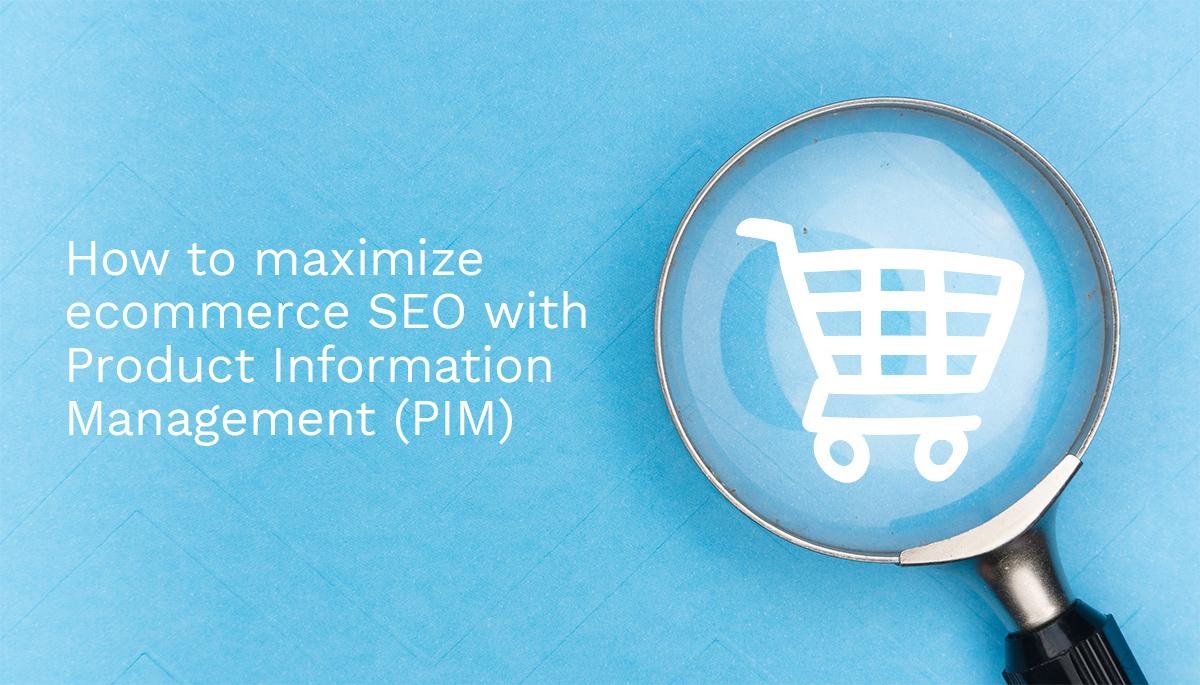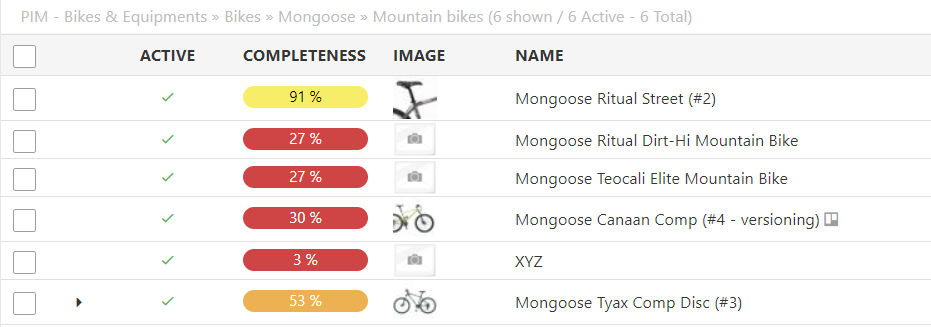It’s no secret that ranking high on search engines is vital to drive revenue and growth. In fact, brands today are looking to maximize their eCommerce SEO strategy with the help of PIM software. Find out how to refine your product data and improve your SEO strategy with Product Information Management.
The Importance of Search Engine Optimization in Ecommerce
If you’re a marketer you’ll likely agree that Search Engine Optimization (SEO) is the most important factor to product visibility and an inbound strategy. In the eCommerce world, an SEO-optimized website means more paying customers coming directly to your storefront.
Regardless of your industry or the product or service you sell, you’ll want to show up for the terms that your buyers are using.
For future buyers to trust your brand, your eCommerce site needs to perform strongly in the right search results. After all, when is the last time you had to go to page 2 on Google to find what you needed?
How PIM Software Can Improve Your Ecommerce SEO Strategy
In this fast-paced digital world, it’s imperative for businesses to tailor their product data for search engine optimization (SEO).
With a Product Information Management (PIM) solution built into your eCommerce website, your brand can enrich and expand your product data with critical details to attract the right buyers – well beyond what’s typically stored in your ERP solution or CMS.
PIM software gives you the tools you need to optimize your content for SEO at scale. Put simply, PIM is the “how”, aka the key ingredient to create an effective SEO strategy.
For brands managing numerous product references, optimizing the SEO for multiple product pages can quickly become a challenge. With a PIM solution, Product and Marketing teams can rely on a centralized product reference source to optimize the SEO of product pages on various distribution channels.
Download Now: Why PIM is Key to Your Ecommerce Success (free whitepaper)
How Search Happens
Put yourself in the shopper’s shoes as they’re researching a potential purchase. They are likely searching for terms related to function or purpose, rather than by product number, brand, or technical name.
That’s where search engines like Google can pair you with the searcher by inferring their intention. Searchers will then often pivot their searches using the results as feedback in identifying other keywords that may refine the search.
For example, if you search for “energy efficient refrigerators” your search results will likely contain references to “Energy Star.” This is a government-backed-program that promotes energy efficiency. In fact, many appliance manufacturers use this emblem to indicate that they are a partner of the program.
That can tell a searcher to search for “energy star refrigerators” and now that search’s results take on another dimension. Does your eCommerce site naturally house that level of rich product data?
Refine Your Product Data SEO Strategy with PIM Software
Even in the realm of selling through Amazon or other third-party marketplaces, rich product information is essential to competing against those selling the exact same product.
If two sellers are selling the same product, the one with the most product information is the only one that is going to garner the most trust and the most conversions.
Figure 1 – Product Details Setup from Amazon Seller’s Guide
So, now that we’ve established the importance of PIM to improve your eCommerce SEO strategy, how do site owners manage product information?
Collecting product data
First, you must decide what product details are critical to your audience, and how to collect that information as efficiently as possible. Even when you’re selling only your own products and not those of other vendors, your product information may currently live in various sources, often siloed, often offline.
These places include the ERP, databases, spreadsheets, print catalogs, hand-written notes: long term memory belonging to product owners. All of these details can be easily centralized and used as needed, whether internally or externally, with a PIM solution.
Using a PIM Solution To Replace Spreadsheets
Many businesses still use spreadsheets to manage their product data. While this may work for a short time and in simple use cases, eventually you’ll want that data to be frequently distributed across multiple sources, channels, vendors, and in various formats or connection methods.
In that case, spreadsheets will fall short. Plus, a PIM solution can capture even richer detail, like videos, images, documents, and even customer reviews.
Even those with a master data system like an ERP will ironically discover the common short supply of information beyond the handful of basic product fields such as name, description, product number, price, and inventory.
Enriching Product Data
The next process that follows collecting information is enrichment – or adding data that build even more trust and conversions. This can be everything under the sun of product attributes that speak to your various audiences like dealers and consumers.
If your product is best appreciated with action shots, then photography supporting that will be essential. If you sell to other countries and languages, then a translator or translation bureau may need access to your PIM data, as well.
Rich media like videos, documentation, product spec sheets, etc. helps to enrich the product experience online with a PIM solution.
Intelligent PIM solutions let you harness AI to gain insights like “completeness” scores. This allows to grade the effectiveness of the product information supplied for each given product based on your goals.
Figure 2- An example of Completeness
Publishing and distributing product data
This is where all of the work in collecting and enriching can be shared with a larger audience through your various channels. Your own ecommerce store is just one place you can distribute your product data to. But with the help of third party marketplaces and social media, PIMs can also publish to these channels to almost instantly. This allows a brand to expand its reach to new buyers.
Not only can a PIM publish to these hundreds of different channels, but they can also decide what information to share on each one. If selling on Amazon or Wayfair, they nearly equally require the same loads of product details to build trust with customers while also keeping them engaged on your site and preventing them from having to continue their search.
Yet, as robust a selling platform as Amazon and Wayfair are, it’s not the same type of information that Instagram requires. There, the audience wants tantalizing images and multiple hashtags that reach interests. All of this information is available in a PIM for products and can be published to different channels with different content.
Why PIM Software Is The Solution You Need To Enrich Your Product Data and Customer Experience
A PIM doesn’t stop with online media, but it can also extend its powers to the offline world for sales sheets, print catalogs, pdfs and more. All in all, creating an exceptional customer experience thoroughly.
Imagine an integrated eCommerce environment where changes from an ERP, coupled with structured product data in the PIM, can immediately be downloaded as a PDF in whatever design or format you choose. The freshest content encapsulated in a file that is instantly available to audiences online.
As eCommerce matures and more companies become deeply aware of the direct correlation of product experience, SEO and online trust, the tools that support these will continue to gain importance. A dedicated PIM solution, integrated with the rest of your technology stack, will effectively improve your data and prepare your digital strategy for success.
————-
About Dynamicweb (VL OMNI Partner)
Dynamicweb offers customers an industry-recognized, award-winning Digital Experience Platform. We enable customers to deliver stellar customer experiences and scale ecommerce success through best-in-class Ecommerce, Content Management (CMS), Product Information Management (PIM) and Digital Marketing solutions. Our PIM solution can be deployed standalone and integrated with your existing technologies, to instantly take your product data and distribution capabilities to the next level.
Dynamicweb partners with VL OMNI to enable seamless integration between PIM, your eCommerce, and various applications across your business. With 300+ connectors living in the VL OMNI library, Dynamicweb customers enjoy seamless, real-time automated data flow across their entire technology stack.
Dynamicweb’s 300+ partners and 200+ employees in offices all around the globe are proud to support well over 4,000 clients. This includes leading brands like Lego, Unilever, Winnebago, L’Oréal, Flying Tiger, and Toyota. Built on Dynamicweb, our customers are empowered to build lifelong customer relationships, increase revenue and grow their brands.
To learn more, please visit: www.dynamicweb.com
 D365 Business Central
D365 Business Central Netsuite
Netsuite





